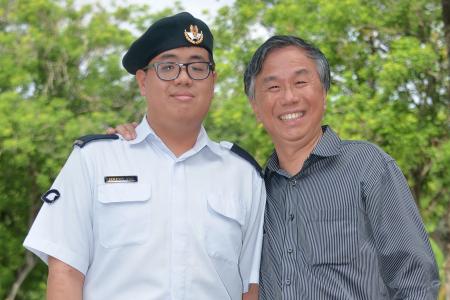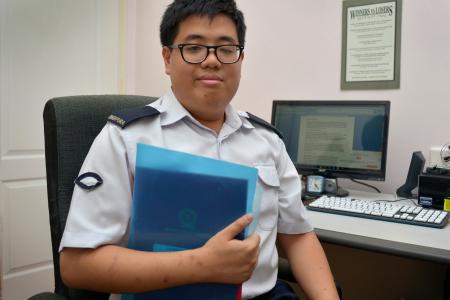Autism doesn’t stop him from doing NS
Having Asperger's Syndrome makes it hard for him to socialise, but he serves national service
His condition was severe enough that he could have been medically exempted from national service.
When he was 15, Mr Jeremy Yap was diagnosed with Asperger's Syndrome, a high-functioning type of autism.
But the 23-year-old decided he wanted to go ahead and serve his NS and on July 15, he completed two years of NS at the RSAF's Air Power Generation Command as a clerk.
He said: "I wanted to serve in the army because it's something my father and all my friends went through.
"I didn't want to be left out just because I'm different."
Those with Asperger's Syndromemay have difficulty interacting with others, said Dr Chong Shang Chee, a consultant at the Child Development Unit (CDU) at the National University Hospital.
She said this includes the inability to read body language and carry out meaningful conversations.
According to the CDU, one in five to eight autistic children has Asperger's Syndrome. Worldwide figures estimate that two to six out of 1,000 children are autistic.
When we first met Jeremy at his family home in Bartley, he appeared nervous. He sat with his body pushed back against the sofa. His fists were clenched and both feet were rooted to the floor.
His parents, Mr Matthew Yap, 57, a crisis management consultant, and Madam Lee Pew Ying, 54, an English teacher, said that they had concerns about their son's development since he was young.
Jeremy said: "In school, I was frequently teased by my classmates and my teachers thought I was deliberately being problematic.
"I felt I could not relate to them at all and they were totally unable to understand me."
After he did badly for his PSLE, his parents decided to home-school him.
For Jeremy's secondary school education, Madam Lee and other private tutors taught him at home.
Because of his autism, seemingly trivial things would give him immense stress.
He explained: "The hardest moment during my NS was when my family moved house.
"Being forced into a new environment totally stressed me out and I couldn't even concentrate on my work in camp."
Suffers of Asperger's Syndrome become distressed when they break away from their usual routine or environment.
Jeremy said: "I refused to enter the new house as I simply couldn't accept the new things around me. I paced up and down, over and over again, studying my new environment until I got used to my surroundings."
His inability to speak openly about his feelings made the situation even more difficult.
It was only when Jeremy enrolled in Republic Polytechnic to pursue a diploma in mass communications and started his national service that his social skills dramatically improved.
He said: "Whenever I faced difficulties, I'd share my concerns with my colleagues and friends. Over time, I learnt how open up to others."
DEGREE
While serving his NS, Jeremy also attended night classes at Kaplan.
He will graduate with a degree in mass communications in December.
Mr Yap was supportive of his son's decision to serve NS, believing it is an "honour to serve the nation".
He said: "Although it may seem like such a small thing, it's a very big step forward for my son.
"I'm very proud of my son and how much he has grown."
Jeremy said: "Despite some claiming (that) national service to be a waste of time, I can only say from my experience that it is not so.
"Throughout my time, I learnt life skills like how to communicate and interact with people, as well as how to manage heavy workloads and maintain relationships with others."
The most meaningful lesson? That each person, no matter how small his role, has an important part to play.
"My commanders taught me that no matter how insignificant my tasks seemed, it ultimately contributes to the unit running smoothly.
"They made me feel important and valued... The things you learn during NS are not things you can learn elsewhere."
Get The New Paper on your phone with the free TNP app. Download from the Apple App Store or Google Play Store now



